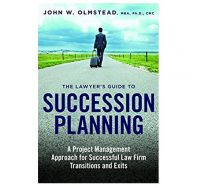Succession Planning
The graceful exit: Leaving practice on a high note

In the last few years of their careers, many lawyers begin to think about the meaning of legacy. What has been my contribution? How will I be remembered? Part of being a professional means having a vision beyond simply working a job and earning money. Most lawyers are guided by personal values, a commitment to… Read More »
Categories: 2017 August Managing Change, Articles, Content Type, Features, Firm Management, LAWPRO Magazine, Legal Careers, Succession Planning, TopicsRetirement, identity, and mental health: It’s an adjustment

Lawyers often pay lip service to looking forward to retirement. However, when pressed on the subject, many admit that their true feelings are mixed. Those who equivocate may have good reason: for many professionals, the adjustment to retirement can be psychologically challenging. A 2013 study¹ showed that retirement increased the risk of clinical depression in… Read More »
Categories: 2017 August Managing Change, Articles, Content Type, LAWPRO Magazine, LAWPRO Magazine Article Type, Legal Careers, Succession Planning, Topics, Wellness, WellnessBook review – The Lawyer’s Guide to Succession Planning

No one likes to think about getting older, and lawyers may tend to put off thinking about the day they have to retire from the profession they love and the firms they have spent a lifetime building. However, the fact is that there is a wave of Boomers hitting retirement age (90 million in North… Read More »
Categories: 2017 August Managing Change, Articles, Book Review, Content Type, Firm Management, Legal Careers, Solo and Small Firm, Succession PlanningPassing the Torch Without Getting Burned: A Guide to Law Firm Retirement & Succession Planning
Peter A. Giuliani, published 2013, 161 pages For law firms, succession is a fact of life: founding partners retire, rainmakers depart, and in the meantime, client relationships must be preserved. Passing the Torch without Getting Burned: A Guide to Law Firm Retirement and Succession Planning is a comprehensive examination of the key economic issues typically… Read More »
Categories: Book, Firm Management, Succession PlanningPartner Departures & Lateral Moves
Geri S. Krauss, published 2009, 110 pages Once it was the exception for a partner to leave a firm. Now “the revolving door” of partner departures has been deemed a “modern-day law firm fixture.” What steps can a departing partner or an acquiring firm take to minimize risks and reduce potential liabilities? This book is… Read More »
Categories: Book, Firm Management, Succession PlanningLawyer’s Guide to Succession Planning: A Project Management Approach for Successful Law Firm Transitions and Exits
John W. Olmstead, published 2016 Sixty-five percent of law firms’ equity partners in the U.S. are in their late 50s or early 60s. Over the next ten years, there will be many partners in firms of all sizes transitioning and exiting their practices. Many solo and sole owner attorneys as well as larger law firms… Read More »
Categories: Book, Firm Management, Legal Careers, Solo and Small Firm, Succession PlanningIncreased run-off insurance: A critical issue often overlooked in lawyers’ estate planning

When a lawyer passes away while still in active private practice, LAWPRO’s run-off coverage kicks in. While standard run-off may be enough coverage for lawyers who have been retired for several years (since potential claims will have had time to develop), it may not be sufficient for a lawyer who was practising full-time at the… Read More »
Categories: Articles, Content Type, Firm Management, LAWPRO policy, Succession Planning